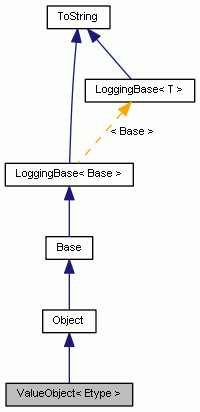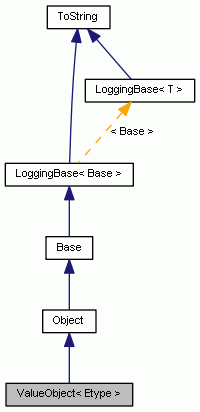 Photon C++ Client API
5.0.7.3
Photon C++ Client API
5.0.7.3
|
 Photon C++ Client API
5.0.7.3
Photon C++ Client API
5.0.7.3
|


Public Member Functions | |
| ValueObject (const ValueObject< Etype > &toCopy) | |
| ValueObject (const Object &obj) | |
| ValueObject (const Object *obj) | |
| ValueObject (const typename Helpers::ConfirmAllowed< Etype >::type &data) | |
| ValueObject (const typename Helpers::ConfirmAllowed< Etype >::type pData, int size) | |
| ValueObject (const typename Helpers::ConfirmAllowed< Etype >::type pData, const int *sizes) | |
| virtual | ~ValueObject (void) |
| virtual ValueObject< Etype > & | operator= (const ValueObject< Etype > &toCopy) |
| virtual ValueObject< Etype > & | operator= (const Object &toCopy) |
| const int * | getSizes (void) const |
| Etype | getDataCopy (void) const |
| Etype * | getDataAddress (void) const |
 Public Member Functions inherited from Object Public Member Functions inherited from Object | |
| Object (void) | |
| virtual | ~Object (void) |
| Object (const Object &toCopy) | |
| bool | operator== (const Object &toCompare) const |
| bool | operator!= (const Object &toCompare) const |
| nByte | getType (void) const |
| nByte | getCustomType (void) const |
| const int * | getSizes (void) const |
| unsigned int | getDimensions (void) const |
| virtual JString & | toString (JString &retStr, bool withTypes=false) const |
| virtual JString & | toString (JString &retStr, bool withTypes=false) const=0 |
| JString | toString (bool withTypes=false) const |
 Public Member Functions inherited from Base Public Member Functions inherited from Base | |
| virtual | ~Base (void)=0 |
 Public Member Functions inherited from LoggingBase< Base > Public Member Functions inherited from LoggingBase< Base > | |
| virtual | ~LoggingBase (void)=0 |
 Public Member Functions inherited from ToString Public Member Functions inherited from ToString | |
| virtual | ~ToString (void) |
| virtual JString | typeToString (void) const |
| JString | toString (bool withTypes=false) const |
Additional Inherited Members | |
 Static Public Member Functions inherited from LoggingBase< Base > Static Public Member Functions inherited from LoggingBase< Base > | |
| static void | setListener (const BaseListener *pBaseListener) |
| static int | getDebugOutputLevel (void) |
| static bool | setDebugOutputLevel (int debugLevel) |
| static const LogFormatOptions & | getLogFormatOptions (void) |
| static void | setLogFormatOptions (const LogFormatOptions &options) |
Container class template for objects to be stored as values in a Hashtable or Dictionary.
| ValueObject | ( | const ValueObject< Etype > & | toCopy | ) |
Copy-Constructor.
Creates an object out of a deep copy of its parameter.
The parameter has to be of the same template instantiation as the object, you want to create.
| toCopy | The object to copy. |
| ValueObject | ( | const Object & | obj | ) |
Constructor.
Creates an object out of a deep copy of the passed Object&.
If the type of the content of the passed object does not match the template instantiation of the object to create, an empty object is created instead of a copy of the passed object, which leads to getDataCopy() and getDataAddress() returning 0.
| obj | The Object& to copy. |
| ValueObject | ( | const Object * | obj | ) |
Constructor.
Creates an object out of a deep copy of the passed Object*.
If the type of the content of the passed object does not match the template instantiation of the object to create, an empty object is created instead of a copy of the passed object, which leads to getDataCopy() and getDataAddress() return 0.
| obj | The Object* to copy. |
| ValueObject | ( | const typename Helpers::ConfirmAllowed< Etype >::type & | data | ) |
Constructor.
Creates an object out of a deep copy of the passed single-value Etype.
| data | The value to copy. Has to be of a supported type. |
| ValueObject | ( | const typename Helpers::ConfirmAllowed< Etype >::type | pData, |
| int | size | ||
| ) |
Constructor.
Creates an object out of a deep copy of the passed single-dimensional Etype-array.
| pData | The array to copy. |
| size | The element count of data. |
| ValueObject | ( | const typename Helpers::ConfirmAllowed< Etype >::type | pData, |
| const int * | sizes | ||
| ) |
Constructor.
Creates an object out of a deep copy of the passed multi-dimensional Etype-array.
| pData | The array to copy. |
| sizes | The array of element counts for the different dimensions of data. |
|
virtual |
Destructor.
|
virtual |
operator= : Makes a deep copy of its right operand into its left operand. This overwrites old data in the left operand.
|
virtual |
operator= : Makes a deep copy of its right operand into its left operand. This overwrites old data in the left operand.
If the type of the content of the right operand does not match the template instantiation of the left operand, then the left operand stays unchanged.
Reimplemented from Object.
| Etype getDataCopy | ( | void | ) | const |
Returns a deep copy of the content of the object. If you only need access to the content, while the object still exists, you can use getDataAddress() instead to avoid the deep copy. That is especially interesting for large content, of course.
If successful, the template instantiations for array types of this function allocate the data for the copy by calling allocateArray<Etype>(), so you have to call deallocateArray() on it, as soon, as you do not need the array anymore. All non-array copies free their memory automatically, as soon as they leave their scope, same as the single indices of the array, as soon, as the array is freed.
In case of an error this function returns 0 for primitive return types and for arrays and an empty object for classes.
| Etype * getDataAddress | ( | void | ) | const |
Returns the address of the original content of the object. If you need access to the data beyond the lifetime of the object, call getDataCopy() instead of this function.
The return type is a pointer to the data, so it is a double-pointer for template instantiations, for which the data itself already is a pointer.
In case of an error, this function returns NULL.